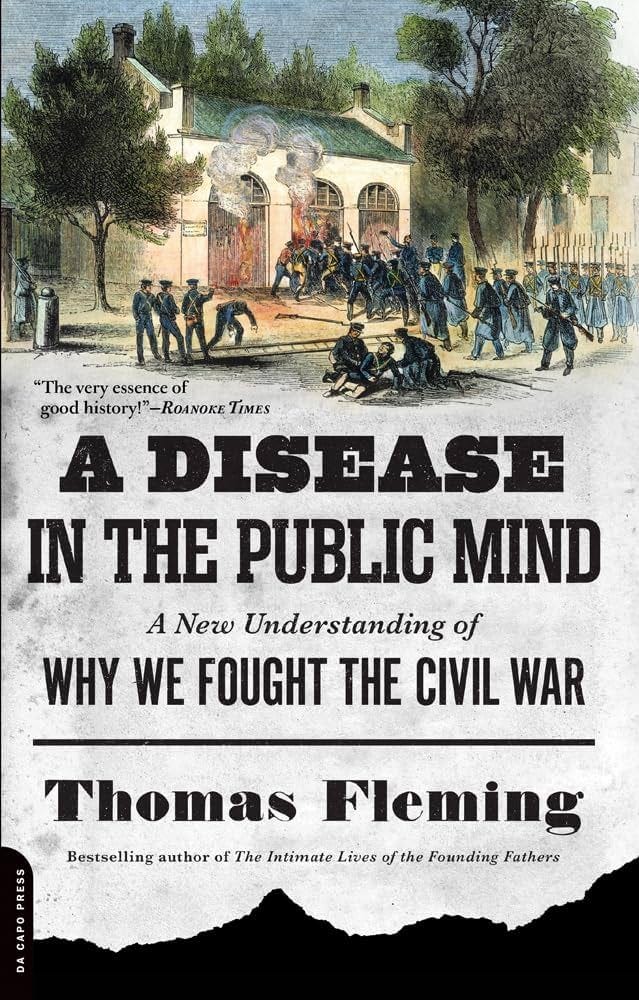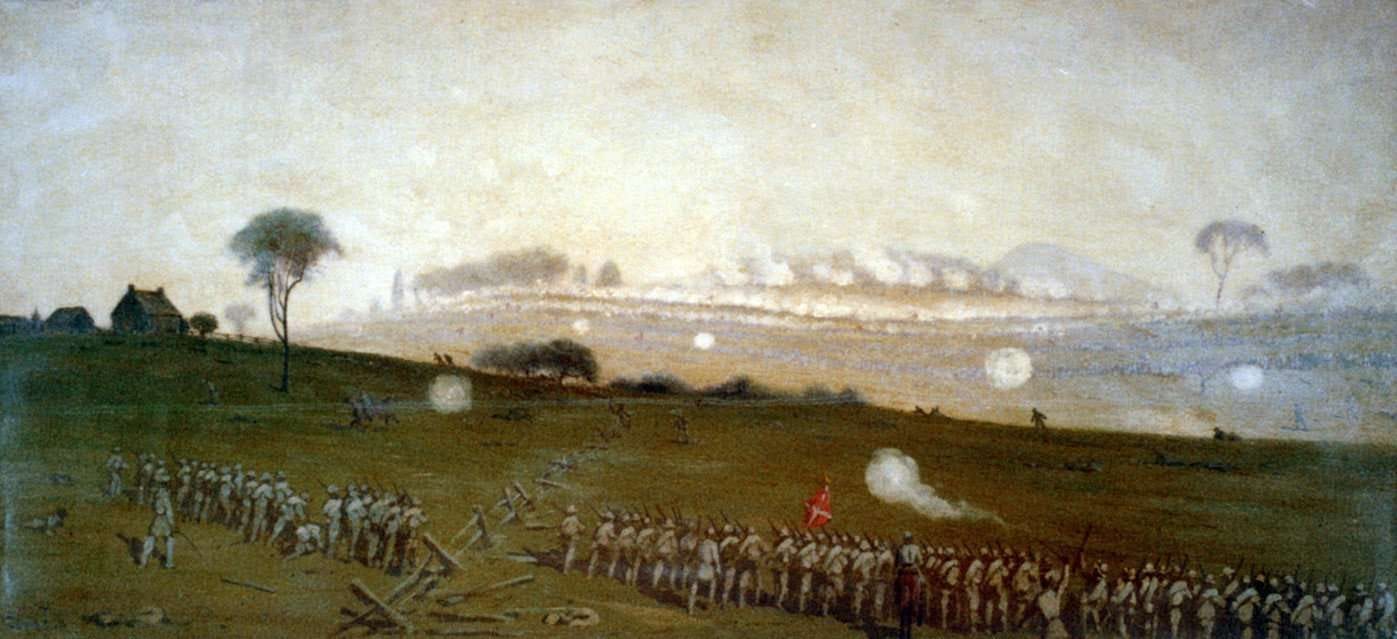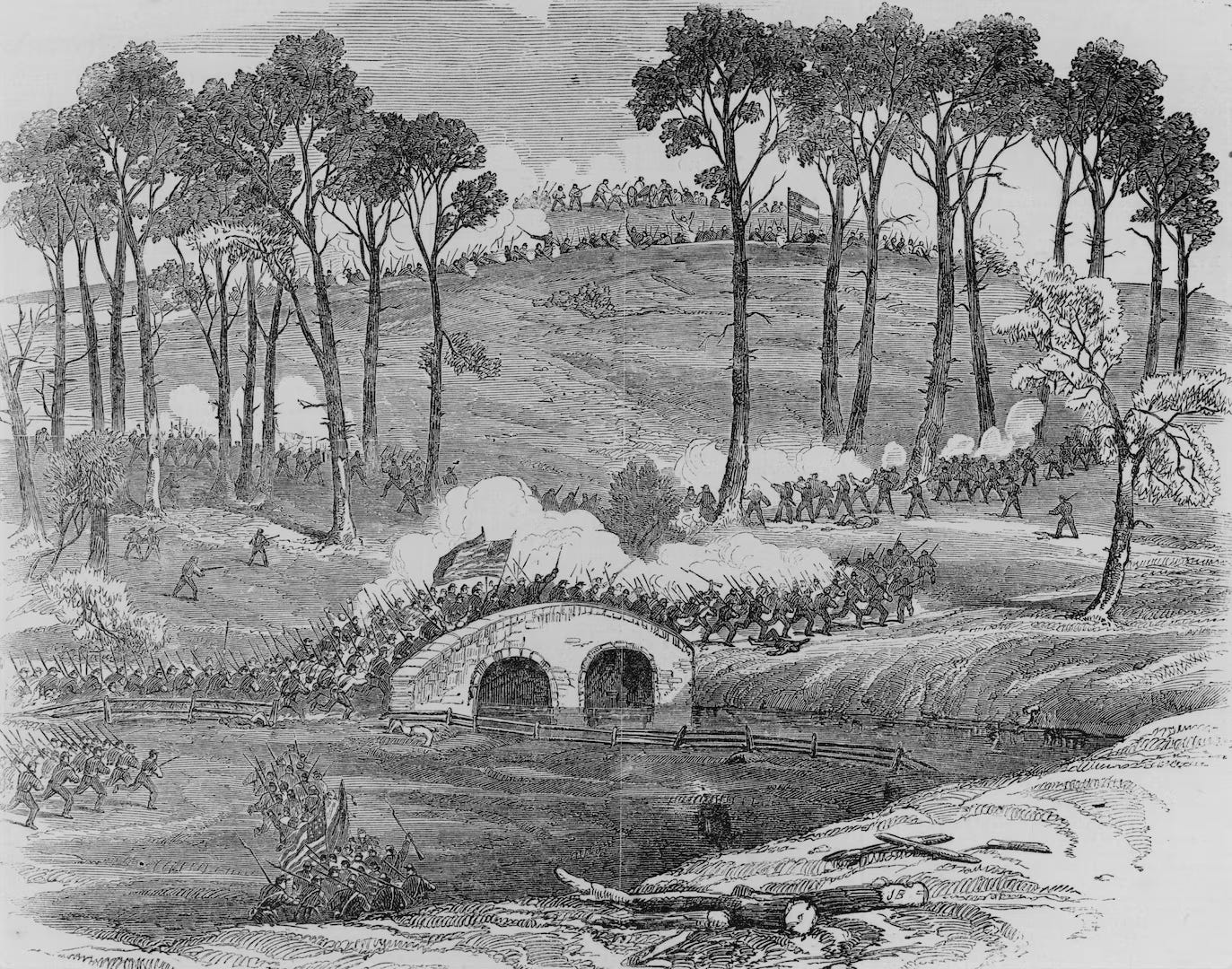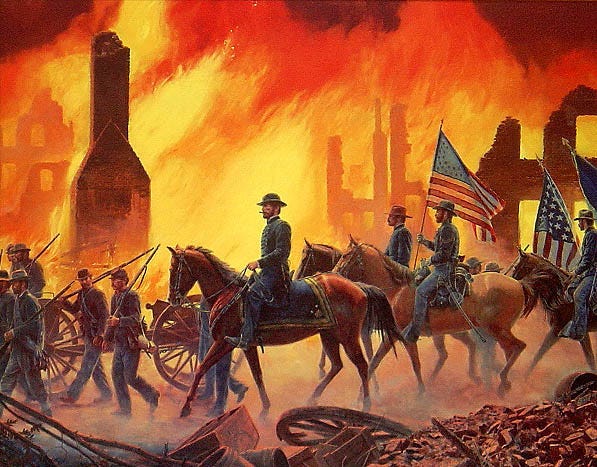I am politely asking you to read this selection from Shelby Foote's The Civil War: A Narrative (Vol. II)
“[T]o sweep from the earth the soil, along with the people.”
I love Shelby Foote’s The Civil War: A Narrative. I think this 3-volume, 2,968-page, 1.2 million-word, conversational history of the American Civil War is the closest thing that America will get to something like The Iliad. America’s national “genius” is on full display in the book, revealing the enormous tragedy of the Civil War and the greatness of the men who fought in it. In a better world, this is something that American students would spend years reading and learning to interpret.
One thing that’s very striking about The Civil War: A Narrative is that it features many eternal situations and types. History is great for that. There is very little new under the sun. While reading through Volume II of the book, I was struck by Foote’s description of the internal opposition that Confederate President Jefferson Davis faced while trying to navigate the later periods of the war, when the military situation (always a longshot) started to get truly bad for the Confederacy.
Davis’s internal enemies, including his own Vice President Alexander H. Stephens, were incensed by the increasing demands of the war. Facing a Northern opponent with a huge advantage in numbers, resources, trade, and industrial capacity, the South’s only real hope rested in measures, like conscription and centralized control of critical resources and war material, that flew in the face of the “states rights” rhetoric that nominally motivated the Secession Crisis (read A Disease in the Public Mind: A New Understanding of Why We Fought the Civil War by Thomas Fleming for a better explanation of what actually caused the conflict).
The South was in a struggle for survival. Defeat in the American Civil War meant, at a minimum, Southerners’ total political and military subjugation. And yet, the nascent Confederacy was still paralyzed by political division and dysfunction during its very short lifespan. Political opposition to Davis’s war measures soon transformed into endless defeatism, advocacy for what amounted to unconditional surrender, and even open sabotage of the war effort, including blocking the transfer of arms and ammunition to critical sections of the front.
Many of the most ardent advocates for secession had entered into an existential conflict without the willingness to do what was necessary to win it, or even, seemingly, an understanding of why it was important to win at all.
Naturally, this brought me back to America 2025, where you see many of the same types and many of the same nonproductive discourse cycles. I really do urge you all to read the following selection on the reaction to Jefferson Davis’s move to suspend habeas corpus, which is basically the right to challenge unlawful detention (i.e. if you suspend it the President can lock up whoever he wants). Union President Lincoln had suspended habeas corpus immediately at the start of the American Civil War, preventing the kind of powerful internal opposition that Confederate President Davis could no longer afford to ignore four years later from ever forming to begin with in the Union.
To make what I’m going for more clear here: I don’t support suspending habeas corpus. It’s not necessary to do that now and might make our situation worse. What is necessary is recognizing that America is in an existential struggle for survival, and the people insisting that we need to die or fall apart over X, Y, or Z supposed principle are actually doing you and the nation a really big disservice.
I’ve broken up the text into more paragraphs to make it more readable and added in my own bolding as well.
[Begin selection]
By suspending habeas corpus, or by ignoring at will such writs as the courts issued, the Northern President kept his left hand free to deal as harshly as he pleased with those who sought to stir up trouble in his rear. It was otherwise with Davis. Denied this resource except in such drastic instances as the insurrection two years ago in East Tennessee, he had to meet this kind of trouble with that hand fettered. Often he had claimed this disadvantage as a virtue, referring by contrast to the North as a land where citizens were imprisioned “in utter defiance of all rights guaranteed by the institutions under which they live.” Now, though, with the approach of the fourth spring of the war, obstruction and defeatism had swollen to such proportions that conscription could scarcely be enforced or outright traitors prosecuted, so ready were hostile judges to issue writs that kept them beyond the reach of the authorities. Davis was obliged to request of Congress that it permit him to follow procedures he had scorned.
“It has been our cherished hope,” he declared in a special message on February 3, “That when the great struggle in which we are engaged was past we might exhibit to the world the proud spectacle of a people … achieving their liberty and independence, after the bloodiest war of modern times, without a single sacrifice of civil right to military necessity. But it can no longer be doubted that the zeal with which the people sprang to arms at the beginning of the contest has, in some parts of the Confederacy, been impaired by the long continuance and magnitude of the struggle…. Discontent, disaffection, and disloyalty are manifested among those who, through the sacrifices of others, have enjoyed quiet and safety at home. Public meetings have been held, in some of which a treasonable design is masked by a pretense of devotion to State sovereignty, and in others is openly avowed…. Secret leagues and associations are being formed. In certain localities, men of no mean position do not hesitate to avow their hostility to our cause and their advocacy of peace on the terms of submission.”
All this was painful to admit, even in secret session, but Davis foresaw still greater problems unless the trend was checked. “Disappointment and despondency will displace the buoyant fortitude which animates [our brave soldiers] now. Desertion, already a frightful evil, will become the order of the day.” He knew how sacred to his hearers the writ was, and he assured them that he would not abuse the license he was asking them to grant him. “Loyal citizens will not feel the danger, and the disloyal must be made to fear it. The very existence of extraordinary powers often renders their exercise unnecessary.” In any case he asserted in conclusion, “to temporize with disloyalty in the midst of war is but to quicken it to the growth of treason. I therefore respectfully recommend that the privilege of the writ of habeas corpus be suspended.”
After twelve days of acrimonious debate—highlighted by an impassioned protest from the Vice President, who sent word from Georgia that if Davis was given the power he sought, “constitutional liberty will go down, never to rise again on this continent”—Congress agreed, though with profound misgivings, to a six-month suspension of the writ. However, the fight did not end there by any means. Stephens and his cohorts merely fell back to prepared positions, ranged in depth along the borders of their several sovereign states, and there continued their resistance under the banner of States Rights.
“Georgians, behold your chains!” an Athens newspaper exhorted in an editorial printed alongside the newly passed regulations, which were appropriately framed in mourning borders. “Freemen of a once proud and happy country, contemplate the last act which rivets your bonds and binds your hand and foot, at the mercy of an unlimited military authority.” An Alabama editor demanded the names of those congressmen “who, in secret conclave, obsequiously laid the liberties of this country at the feet of the President,” so that they could be defeated if they had the gall to stand for re-election. Henry Foote, having long since warned that he “would call upon the people to rise, sword in hand, to put down the domestic tyrant who sought to invade their rights,” proceeded to do just that.
Nor was this defiance limited to words. Under the leadership of such men, Mississippi and Georgia passed flaming resolutions against the act; Louisiana presently did so, too, and North Carolina soon had a law on its books nullifying the action of the central government. Not even these modifications, crippling as they were to the purpose for which the writ had been suspended, allayed the fears of some that the rights of the states were about to be lost in “consolidation.” If such a catastrophe ever came to pass, a Virginian declared, “it would be a kind boon in an overruling Providence to sweep from the earth the soil, along with the people. Better to be a wilderness of waste, than a lasting monument of lost liberty.
A wilderness of waste was what was all too likely to result from this nonrecognition of the fact that the South’s whole hope for independence was held up by the bayonets of her soldiers, who in turn required the support of a strong central government if they were to be properly employed—or even, for that matter, clothed and fed—in a years-long conflict so costly in blood and money, at the stage it now had reached, that its demands could only be met by the enactment and rigid enforcement of laws which did in fact, as those who opposed them charged, involve the surrender of basic “rights” hitherto reserved to the states and the individual. Yet this was the one sacrifice the “impossiblists,” who valued their rights above their chance at national independence, could not make.
“Away with the idea of getting independence first, and looking after liberty afterwards,” Stephens had said. “Our liberties, once lost, may be lost forever.” “Why sir,” a Georgia congressman exclaimed, “this is a war for the Constitution! It is a constitutional war.” It was also, and first, a war for survival; but the ultra-conservatives, including the fire-eaters who had done so much to bring it on, had been using the weapon of States Rights too long and with too much success, when they were members of the Union, to discard it now that they had seceded. They simply would rather die than drop that cudgel, even when there was no one to use it on except their own people and nothing to strike at except the solidarity that was their one hope for victory over an adversary whose reserves of men and wealth were practically limitless. It was this inflexibility that the bill came due for having launched a conservative revolution, and apparently it was necessarily so, even though their anomalous devotion to an untimely creed amounted to an irresistible death-wish. But that was precisely their pride. They inherited it and they would hand it down, inviolate, to the latest generation; or they would pray God “to sweep from the earth the soil, along with the people.”
Most recent podcast episodes:
Ep74: The Mega WW2 episode (Paid)
Ep73: I hated normieslop F1 the Movie (2025) in a way I didn’t think possible (Paid)
Ep69: Zen police ultraviolence simulator Ready or Not (2023) is the only game for our time (Paid)
Ep68: “Days of Rage” is the most important book for you to read today, right now (Paid)
Ep66: Mission Impossible has fallen (Paid)
Ep65: The definitive introduction to LOST: Season 1, objectively the best television ever produced (Paid)
I’m happy because I love you








You can always count on the principled constitutional conservative to do the exact wrong thing.
Huh, interesting bit from history.
Anyways, can you do a piece on how we should vote for Democrats in the Midterms because Trump betrayed his supporters by failing to confirm my theories about Jeffrey Epstein, the sole basis on which he was elected? Honestly at this point I believe we’d be better off under Kamala, I deeply regret my vote.
My only recourse is that I can redeem my vote by supporting BASED Gavin Newsom in 2028, who will covertly support my esoteric variant of far right white identity politics